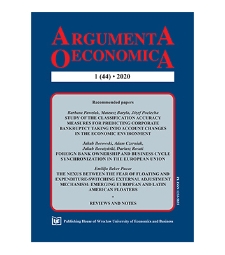Obiekt
Tytuł: LC-IRT models with covariates in Polish job satisfaction analysis
Autor:
Opis:
Argumenta Oeconomica, 2020, Nr 1 (44), s. 207-226
Abstrakt:
Wydawca:
Wydawnictwo Uniwersytetu Ekonomicznego we Wrocławiu
Miejsce wydania:
Data wydania:
Typ zasobu:
Identyfikator zasobu:
doi:10.15611/aoe.2020.1.09 ; oai:dbc.wroc.pl:75781
Język:
Powiązania:
Argumenta Oeconomica, 2020, Nr 1 (44)
Prawa:
Pewne prawa zastrzeżone na rzecz Autorów i Wydawcy
Prawa dostępu:
Dla wszystkich zgodnie z licencją
Licencja:
CC BY-NC-ND 3.0 PL
Lokalizacja oryginału:
Tytuł publikacji grupowej:
Kolekcje, do których przypisany jest obiekt:
- Dolnośląska Biblioteka Cyfrowa > Uczestnicy Konsorcjum > 04. Uniwersytet Ekonomiczny we Wrocławiu > Czasopisma wydawane przez Wydawnictwo UEW > Argumenta Oeconomica
- Dolnośląska Biblioteka Cyfrowa > Zasoby > 2. Czasopisma > Czasopisma współczesne
Data ostatniej modyfikacji:
26 maj 2022
Data dodania obiektu:
23 cze 2020
Liczba wyświetleń treści obiektu:
347
Wszystkie dostępne wersje tego obiektu:
https://dlibra.kdm.wcss.pl/publication/144333
Wyświetl opis w formacie RDF:
Wyświetl opis w formacie OAI-PMH:
| Nazwa wydania | Data |
|---|---|
| LC-IRT models with covariates in Polish job satisfaction analysis | 26 maj 2022 |
Podobne
Genge, Ewa
Genge, Ewa
Genge, Ewa
Genge, Ewa
























